(完整版)2017年中考英语专题与练习现在完成时与一般过去时的区别(含答案)
中考中考英语专题--动词的时态现在完成时(带答案)
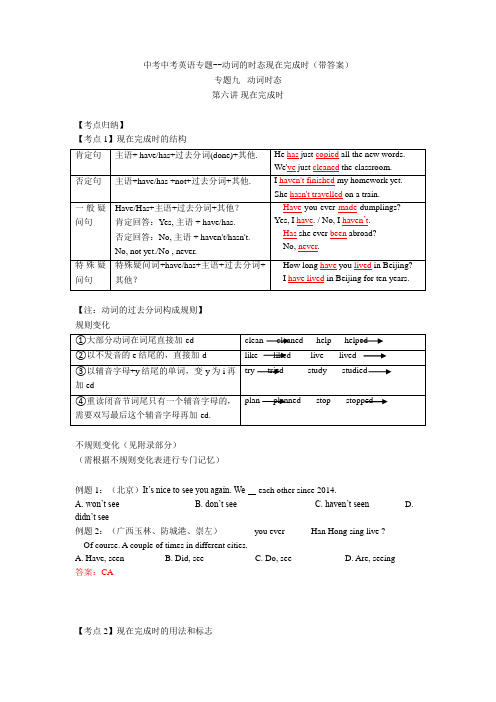
中考中考英语专题--动词的时态现在完成时(带答案)专题九动词时态第六讲现在完成时【考点归纳】【考点1】现在完成时的结构肯定句主语+ have/has+过去分词(done)+其他.He has just copied all the new words.We've just cleaned the classroom.否定句主语+have/has +not+过去分词+其他.I haven't finished my homework yet.She hasn't travelled on a train.一般疑问句Have/Has+主语+过去分词+其他?肯定回答:Yes, 主语 + have/has.否定回答:No, 主语 + haven't/hasn't.No, not yet./No , never.---Have you ever made dumplings? ---Yes, I have. / No, I haven’t.---Has she ever been abroad?---No, never.特殊疑问句特殊疑问词+have/has+主语+过去分词+其他?---How long have you lived in Beijing?---I have lived in Beijing for ten years.【注:动词的过去分词构成规则】规则变化①大部分动词在词尾直接加-ed clean cleaned help helped②以不发音的e结尾的,直接加-d like liked live lived③以辅音字母+y结尾的单词,变y为i再加edtry tried study studied④重读闭音节词尾只有一个辅音字母的,需要双写最后这个辅音字母再加-ed.plan planned stop stopped不规则变化(见附录部分)(需根据不规则变化表进行专门记忆)例题1:(北京)It’s nice to see you again. We each other since 2014.A. won’t seeB. don’t seeC. haven’t seenD. didn’t see例题2:(广西玉林、防城港、崇左)---_____ you ever _____ Han Hong sing live ?---Of course. A couple of times in different cities.A. Have, seenB. Did, seeC. Do, seeD. Are, seeing答案:CA【考点2】现在完成时的用法和标志用法 1. 表示过去的动作一直持续的现在,而且还可能继续下去。
中考英语--一般过去时和现在完成时的区别

中考英语--一般过去时和现在完成时的区别一. 一般过去时用法:表示过去发生的动作或者存在的状态。
例:I drunk a lot of tea last night.我昨天晚上喝了很多茶。
(喝了很多茶这件事发生在昨天晚上,已经结束了。
)这个动作,表示在时间轴上,可以参考下图:I ran my bike to go to school when I was in middle school.我上中学的时候,每天骑自行车去学校。
(骑自行车上学这件事发生在我上中学这个时间段内,现在已经不这样了。
)二. 现在完成时用法1. 表示过去发生的动作对现在的影响。
例:Would you like a cup of tea?你要来一杯茶吗?I have drunk a lot of tea by now.我到目前为止已经喝了很多茶了。
(喝茶这个动作发生在过去,对现在的影响是我已经喝够了。
——言外之意,你再请我喝茶我就不喝了。
)这个动作,表示在时间轴上,可以参考下图:用法2.表示动作发生在过去,持续到现在,且有可能继续持续下去。
例:I like tea very much.我很喜欢喝茶。
I have drunk different kinds of tea by now.我到现在为止喝过好多种类的茶了。
(基于前文给出的背景,可以得知,我喝茶这个动作开始于过去,一直持续到现在,并且很可能以后还会继续喝不同种类的茶。
)我们来对比上面所给出的例句,会发现这样两点不同:1. 一般过去时,时间状语往往很明确,就是具体的过去某个时间。
现在完成时,时间状语往往比较含糊,没有给出明确具体的时间。
2. 一般过去时,动作或者状态在过去某个时间已经结束了,和现在没有一点关系。
现在完成时,动作是发生于过去,和现在有密切联系。
一般过去时--现在完成时--区别及练习题

现在完成时与一般过去的区别1.两个时态的侧重点不同现在完成时强调的是过去的动作对现在的影响,它和现在有密切的联系。
一般过去时强调的是动作发生的时间、地点,不涉及对现在的影响。
She has seen the film before. 她看过这部电影。
(强调她已经看过了)She saw the film last night. 她昨晚看了这部电影。
(强调时间是昨晚)Mr Green has bought a new computer. 格林先生买了一台新电脑。
(强调格林先生现在有了一台新电脑)Mr Green bought a new computer yesterday. 格林先生昨天买了一台新电脑。
(强调买新电脑的时间是昨天)。
2.两个时态的时间状语不同。
现在完成时常与already,yet,just,ever,never,before等副词以及“for+一段时间”,“since+过去时间/从句”等时间状语连用。
不能单独与表示过去的时间状语连用。
一般过去时则常与“一段时间+ago”,just now,yesterday,last week等表示过去时间的状语连用。
Mike has lived in Beijing for 5 years. 麦克在北京住了五年了。
(强调已经住了五年)Mike lived in Beijing 5 years ago. 五年前麦克住在北京。
(强调时间点是五年前)Lucy has just called you. 露西刚打过电话给你。
(强调已经打过电话了)Lucy called you just now. 露西刚才给你打了电话。
(强调打电话的时间是刚刚)注意点:(现在完成时的常用句型1.It is the first / sec ond time…. that…结构中的从句部分用现在完成时.It was the second time that the girl had been late. 这是女孩第二次迟到了。
一般过去时和现在完成时的区别总结
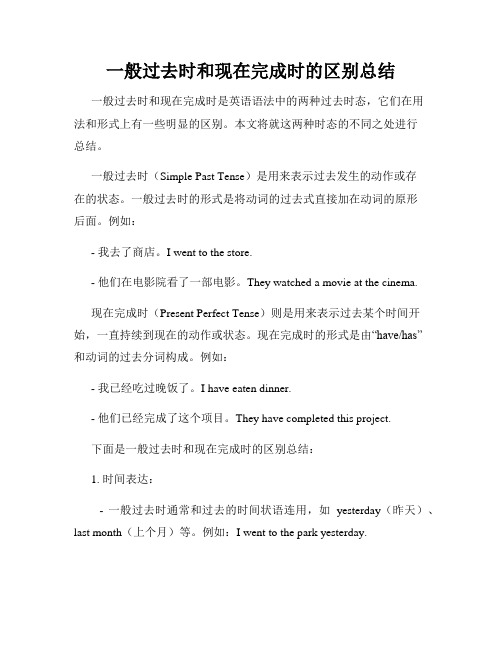
一般过去时和现在完成时的区别总结一般过去时和现在完成时是英语语法中的两种过去时态,它们在用法和形式上有一些明显的区别。
本文将就这两种时态的不同之处进行总结。
一般过去时(Simple Past Tense)是用来表示过去发生的动作或存在的状态。
一般过去时的形式是将动词的过去式直接加在动词的原形后面。
例如:- 我去了商店。
I went to the store.- 他们在电影院看了一部电影。
They watched a movie at the cinema.现在完成时(Present Perfect Tense)则是用来表示过去某个时间开始,一直持续到现在的动作或状态。
现在完成时的形式是由“have/has”和动词的过去分词构成。
例如:- 我已经吃过晚饭了。
I have eaten dinner.- 他们已经完成了这个项目。
They have completed this project.下面是一般过去时和现在完成时的区别总结:1. 时间表达:- 一般过去时通常和过去的时间状语连用,如yesterday(昨天)、last month(上个月)等。
例如:I went to the park yesterday.- 现在完成时通常和表示从过去到现在的时间段的时间状语连用,如since(自从)、for(持续)等。
例如:I have lived here for five years.2. 动作完成:- 一般过去时表示过去某个具体时间的动作,动作已经完成。
例如:She finished her homework last night.- 现在完成时表示动作从过去某个时间开始,一直持续到现在,或者与现在有关。
例如:He has studied English since he was a child.3. 强调结果:- 一般过去时更注重过去发生的动作本身。
例如:I bought a new car.- 现在完成时更注重过去动作对现在造成的结果或影响。
现在完成时和一般过去时的区别
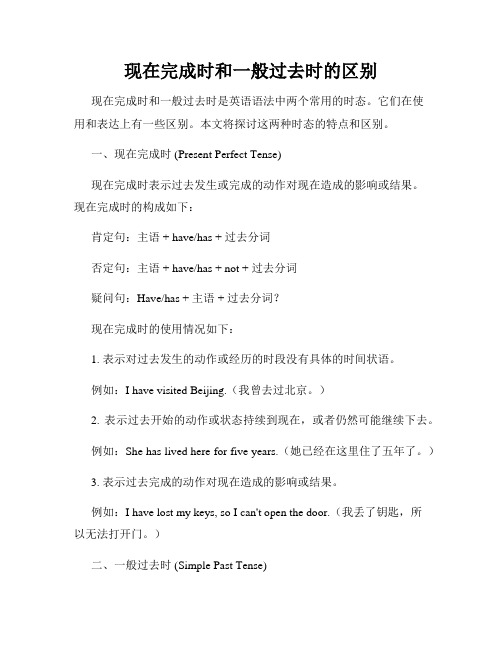
现在完成时和一般过去时的区别现在完成时和一般过去时是英语语法中两个常用的时态。
它们在使用和表达上有一些区别。
本文将探讨这两种时态的特点和区别。
一、现在完成时 (Present Perfect Tense)现在完成时表示过去发生或完成的动作对现在造成的影响或结果。
现在完成时的构成如下:肯定句:主语 + have/has + 过去分词否定句:主语 + have/has + not + 过去分词疑问句:Have/has + 主语 + 过去分词?现在完成时的使用情况如下:1. 表示对过去发生的动作或经历的时段没有具体的时间状语。
例如:I have visited Beijing.(我曾去过北京。
)2. 表示过去开始的动作或状态持续到现在,或者仍然可能继续下去。
例如:She has lived here for five years.(她已经在这里住了五年了。
)3. 表示过去完成的动作对现在造成的影响或结果。
例如:I have lost my keys, so I can't open the door.(我丢了钥匙,所以无法打开门。
)二、一般过去时 (Simple Past Tense)一般过去时表示过去某个具体时间发生的动作或状态。
一般过去时的构成如下:肯定句:主语 + 过去式否定句:主语 + did not + 动词原形疑问句:Did + 主语 + 动词原形?一般过去时的使用情况如下:1. 表示过去某个确定的时间发生的动作或状态。
例如:I watched a movie yesterday.(我昨天看了一部电影。
)2. 表示过去的经历或习惯性动作。
例如:He used to live in London.(他过去住在伦敦。
)三、1. 时间表达:- 现在完成时强调的是过去发生的动作对现在的影响或结果,一般不具体指明具体的时间点。
- 一般过去时强调的是过去某个具体的时间点发生的动作或状态。
2. 表达方式:- 现在完成时使用have/has加过去分词的形式,表示动作已经完成。
一般过去时和现在完成时练习题_含答案(推荐5篇)

一般过去时和现在完成时练习题_含答案(推荐5篇)第一篇:一般过去时和现在完成时练习题_含答案一般过去时和现在完成时练习题1.A.用 already或 yet1)Have they taken down the old pictures ______? No, they haven’t____ ___.2)Most of us have finished our compositions _____.3)He said he hadn’t visited the exhibition _____ ___.B.用since或 for1)We have learned five lessons __ ___ the beginning of this term.2)Mrs Liao has been in hospital __ _ ___last week.3)I have stayed at my aunt’s _____two weeks.C.用have gone或 have been1)Where are the boy students? They _____ to the school factory.2)Is your father in? No, he ____ to Shenzhen._______he ever ______ there before ?Yes, he ___ there several times3)He asked me if I_____ to Hangzhou before.I told him that I wanted to go there for a visit as I ____ never ____ to that city before.2.选择填空1.Mother ____me a new coat yesterday.I _______ it on.It fits me well.A.had made…have triedB.made…have tried C.has made…triedD.made…tried2 “He ____to draw horses already”.“When ______ he ?” “ Last year “A.learned...hasB.learned...didC.has learned...hasD.has learned (i)3.Tom _____up into the tree.Look, he ____ high up there!A.has got…isB.has climbed…wasC.got …wasD.climbed…is4.____ you _____ the text yet ? Yes, we ____ it two hours ago.A.Did...copy...didB.Have...copied...haveC.Have...copied (i)D.Did …copy…had5.“Why ______ she _______ angry ?” “Because he _____ at her just now.”A.did…get…shoutedB.has…got…shoutedC.did…get…has shoutedD.has…got…has shouted6.______you __________ the film before ? Where _____ you ____ it ?A.Have …seen…did…seeB.Did …see…did…watchC.Have…see n…have…seenD.Did …see…have…seen7.You ____ me waiting for two hours.I ____ for you since five.A.kept…waitedB.have kept…waitedC.kept…have waitedD.have kept…have waited8.Where ______ John _______ ? To the library.He _________ there for an hour.A.has…been…has gone B.has…gone…has beenC.did…go…wentD.did…be…went9.______ the baby still _____ ? No, it _______ crying.A.Has…cried…has stopped B.Is…crying…stoppedC.Did …cry…stoppedD.Is…crying…has stopped10.I _______ the way.I ________ here for quite many years.A.knew...have livedB.knew...liveC.know...have livedD.know (iv)11._____ you ever _____ America ? Yes, I have.A.Have…gone toB.Have…gone inC.Have…been toD.Have …been in12.My brother ____college for over three years.A.has gone toB.has been to C.has been inD.has been at13.He ________ the Army by the end of 1989.He ______ in the army since then.A.joined…isB.has joined…has beenC.had joined…isD.had joined …has been14.By the time I _____ back they ____ up ten satellites.A.came…have sentB.came…had e…havesentD.had come…sent15.Jack ____ over five lessons by seven o’clock.Then he ____a rest.A.went…tookB.went…had takenC.had gone…tookD.had gone…had taken16.We ____ out by that time that he ____ a spy for a long time.A.had found…had beenB.had found…wasC.found…had beenD.found…was17.Before the news ____ him, he ____ to know about it.A.reaches…has got B.reached…had got C.reached…gotD.had reached…got18.I _____ him a second letter before I ____ from him.A.wrote…heardB.wrote…had heardC.had written…heardD.have written…hear19.People ____ that the soldiers _____ fighting.A.say…had stoppedB.said…has stoppedC.say…stoppedD.said…had stopped20.We ____ in a good harvest because we ____ enough rain.A.didn’t get…had hadB.got…had hadC.had got…had hadD.got…hadn’t had21.They _______ for five hours when they ______ in New York.A.flew…arrivedB.had flown…had arrivedC.flew…had arrivedD.had flown…arrived22.She ____ that it _____ for two days by that day.A.says…has ra inedB.says…had rainedC.said…had rainedD.said…rained23.John _____ there since the year before, so he _____ them.A.had worked…knewB.had worked…had knownC.worked…knewD.worked…had known24.He _____ angry because he ____ for a long time.A.had got…had waitedB.got…waitedC.had got…waitedD.got…had waited25.-I have seen the film “Titanic” already.-When __________you __________ it?-The day before yesterday.A.have; seenB.will; seeC.did;seeD.did; seen26.Mr Black __________ in China since five years ago.A.livedB.has livedC.livesD.is going to live27.We ____________ trees last Sunday.So far we __________ over 3,000 trees there.A.planted; plantedB.planted; have plantedC.have planted; plantedD.have planted; have planted练习答案:1.A.1)yet, yet2)already3)yetB.1)since2)since3)sinceC.1)have been2)has gone, Has, been, has been3)have been, have been2.BDACAADBDCCDDBCABCDBDCADCBB第二篇:一般过去时与现在完成时比较练习题一般过去时与现在完成时比较练习题I.用所给动词的适当形式填空。
完整版)一般过去时和现在完成时的区别练习题
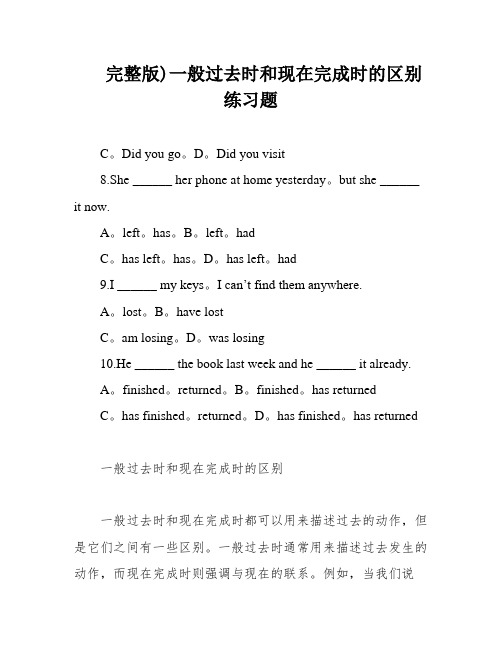
完整版)一般过去时和现在完成时的区别练习题C。
Did you go。
D。
Did you visit8.She ______ her phone at home yesterday。
but she ______ it now.A。
left。
has。
B。
left。
hadC。
has left。
has。
D。
has left。
had9.I ______ my keys。
I can’t find them anywhere.A。
lost。
B。
have lostC。
am losing。
D。
was losing10.He ______ the book last week and he ______ it already.A。
finished。
returned。
B。
finished。
has returnedC。
has finished。
returned。
D。
has finished。
has returned 一般过去时和现在完成时的区别一般过去时和现在完成时都可以用来描述过去的动作,但是它们之间有一些区别。
一般过去时通常用来描述过去发生的动作,而现在完成时则强调与现在的联系。
例如,当我们说“我去年去了北京”时,我们使用的是一般过去时,因为这个动作发生在过去。
但是,如果我们说“我去过北京”,我们使用的是现在完成时,因为这个动作与现在有联系,可能是我们最近去过北京或者我们曾经去过北京但是现在不再去了。
单项填空。
1.- 对不起,XXX,我借了你的收音机很长时间了。
- 没关系。
A。
借了。
B。
借出C。
保留。
D。
归还2.- 最近你去哪里了。
- 我和朋友去了扬州。
A。
去了,去了。
B。
去了,在那里C。
去了,来了。
D。
去了,回来了3.- 你父亲在哪里?我们已经好几周没见了。
- 他去美国了。
A。
他去了美国。
B。
他去了英国C。
他要去澳大利亚。
D。
他要去看我的祖父母4.自从工厂开业以来,他们一直在这里工作。
A。
离开了学校。
B。
加入了团队C。
一般过去时与现在完成时辨析(含习题)

C. Have…seen…have…seen D. Did …see…have…seen
5. _____ you ever _____ America ? Yes, I have.
A. Have…gone to B. Have…gone in C. Have…been to D. Have
…been in
课中讲解 二 现在完成时 (I have done)
• have been(to)与have gone( to)的区别: have been(to)表示“去过某地(现在已经回来了)”,可用于各 人称; have gone(to)表示“去某地了(说话时某人不在当地)”,常用 于第三人称,前者可与once ,never, several times等连用,后者则不 能。 如:They have been to Beijing twice.他们去过北京两次。 He has gone to Beijing . 他去北京了。
• 一般过去时只讲述过去发生的情况。 Tom lost his key.
课中讲解 三
现在完成时 (have done)&一般过去时 (did)
• 现在完成时总是用来讲述现在的情况。 Tom has lost his key. 表示他现在没有钥匙
• 一般过去时只讲述过去发生的情况。 Tom lost his key. 这并没有告诉我们汤姆现在是否有钥匙 ,只说明他在过去某个时
候把钥匙弄丢了。
课中讲解 三
现在完成时 (have done)&一般过去时 (did)
• 现在完成时总是用来讲述现在的情况。 Tom has lost his key. 表示他现在没有钥匙
• 一般过去时只讲述过去发生的情况。 Tom lost his key. 这并没有告诉我们汤姆现在是否有钥匙 ,只说明他在过去某个时
(完整版)现在完成时与一般过去时的区别
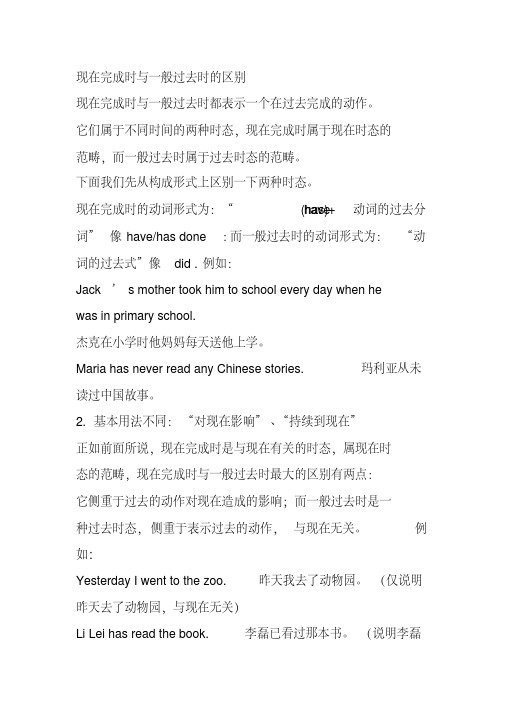
现在完成时与一般过去时的区别现在完成时与一般过去时都表示一个在过去完成的动作。
它们属于不同时间的两种时态,现在完成时属于现在时态的范畴,而一般过去时属于过去时态的范畴。
下面我们先从构成形式上区别一下两种时态。
(has)+动词的过去分现在完成时的动词形式为:“have词”像have/has done:而一般过去时的动词形式为:“动词的过去式”像did .例如:Jack’s mother took him to school every day when hewas in primary school.杰克在小学时他妈妈每天送他上学。
Maria has never read any Chinese stories. 玛利亚从未读过中国故事。
2. 基本用法不同:“对现在影响”、“持续到现在”正如前面所说,现在完成时是与现在有关的时态,属现在时态的范畴,现在完成时与一般过去时最大的区别有两点:它侧重于过去的动作对现在造成的影响;而一般过去时是一种过去时态,侧重于表示过去的动作,与现在无关。
例如:Yesterday I went to the zoo.昨天我去了动物园。
(仅说明昨天去了动物园,与现在无关)Li Lei has read the book. 李磊已看过那本书。
(说明李磊了解那本书的内容)另外,现在完成时还可以表示动作从过去某个时候开始一直延续到现在,强调动作的延续性它常与for及since引导的一段时间状语连用。
例如:He has lived here for ten years. 他已在这儿住了10年了。
比较:1.) The Greens have worked in China since 1998.格林一家自1998年到现在一直在中国工作。
The Greens worked in China in 1998.格林一家1998年在中国工作。
2.) He has lived in the country for a long time. 他在农村生活了很长时间。
现在完成时讲解和一般过去式的区别及练习题

* 以ever和never为标志 ever和never为标志 This is the best film I have ever seen. 这是我 曾经看过的最好的一部电影。 He has never been to Beijing. 他从没有到过北 京。 * 以动作发生的次数为标志 He says he has been to the USA three times. times. 他说他已经去过美国三次了。 * 以so far(到目前为止)为标+before far(到目前为止)为标+before He has got to Beijing so far. 到目前为止他 已到了北京。
一般过去时与现在完成时 用法比较
过去时表示过去某时发生的动作或单纯叙述过去 的事情,强调动作;现在完成时为过去发生的, 现在完成时为过去发生的, 的事情,
强调过去的事情对现在的影响,强调的是影 强调过去的事情对现在的影响, 响。
过去时常与具体的时间状语连用,而现在完成时 过去时常与具体的时间状语连用, 通常与模糊的时间状语连用,或无时间状语。 通常与模糊的时间状语连用,或无时间状语。 一般过去时的时间状语: 一般过去时的时间状语: yesterday, last week,…ago, in1980, in Octo week, ber, just now, 具体的时间状语 共同的时间状语: 共同的时间状语: this morning, tonight, this April, now, once, once, before, already, recently,lately recently,
现在完成时讲解和它与一 般过去时的区别
一、过去分词
1 、规则动词: 规则动词:
规则动词的过去分词的构成规则与规则动 词的过去式的构成规则相同。四点变化规 则:
中考英语语法知识:英语的时态

中考英语语法知识:英语的时态2017年中考英语语法知识:英语的时态语法中的时态(tense)是一种动词形式,不同的时态用以表示不同的时间与方式。
是表示行为、动作、状态在各种时间条件下的动词形式,在英语中有16种时态。
以下是店铺搜索整理的关于2017年中考英语语法知识:英语的时态,供参考学习,希望对大家有所帮助!想了解更多相关信息请持续关注我们店铺!一、知识要点时态的构成 (以speak为例)一般进行完成现在speak / speaksam/ is/ are speakinghas / have spoken 过去spokewas / were speakinghad spoken将来shall/ will speakis/ am/ are going to speakshould / would speakwas/ were going to speak\1.一般现在时的用法①表示经常发生的动作或者经常存在的状态。
经常和表示时间的状语often,always,usually,sometimes,every day等连用。
My sister usually goes to school on foot. 我姐姐经常步行去上学。
We often come to school at six in the morning. 我们经常在早上六点到学校。
②表示某种习惯或者能力,也可以表示职业、特征等。
My mother often gets up very early in the morning. 我的妈妈经常在早上起床很早。
This kind of car runs very fast. 这种小汽车跑得非常快。
③表示客观事实、客观规律或者客观真理。
This kind of trees never grows in the desert. 这种树从来不在沙漠里生长。
Do you know that knowledge is power? 你知道知识就是力量吗?④在时间、条件、让步等状语从句中,表示将来的动作。
一般过去时。现在完成时。区别及练习题

一般过去时。
现在完成时。
区别及练习题精诚教育专注于中学生的教育。
现在完成时和一般过去时有所不同,它强调过去的动作对现在的影响,而一般过去时则强调动作发生的时间和地点,不涉及对现在的影响。
例如,她看过这部电影(现在完成时,强调已经看过了),她昨晚看了这部电影(一般过去时,强调时间是昨晚)。
现在完成时常与表示过去的时间状语连用,如already、yet、just、ever、never、before,以及“for+一段时间”、“since+过去时间/从句”等。
而一般过去时则常与表示过去时间的状语连用,如“一段时间+ago”、just now、yesterday、last week等。
例如,XXX在北京住了五年了(现在完成时,强调已经住了五年),五年前XXX住在北京(一般过去时,强调时间点是五年前)。
在现在完成时的常用句型中,结构中的从句部分要用现在完成时。
例如,这是女孩第二次迟到了(It was the second time that the girl had been late),这是我第一次游览长城(It is the first time that I have visited the Great Wall)。
另外,使用“Thisis the… that…”结构时,从句也要用现在完成时。
例如,这是我看过的最好的电影(This is the best film that I've ever seen)。
This is the first time I have XXX.1.A.用already或yet1) Have they taken down the old pictures yet。
No。
they haven’t yet.2) Most of us have already XXX.3) He said XXX.B.用since或for1) We have XXX term.2) Mrs Liao has been in hospital since last week.3) I have stayed at my aunt’s for two weeks.C.用have gone或have been1) Where are the boy students。
现在完成时和过去时的区别及练习

现在完成时和过去时的区别及练习一、现在完成时的用法。
1.现在完成时强调过去动作对现在的影响I have lost my wallet now. I can’t find it now.我的钱包掉了,我现在找不到。
2.现在完成时强调过去动作一直持续到现在。
I have had this book for a year.我拥有这本书1年了。
3.现在完成时表示动作尚未完成。
I have lived here for 5 years. 我在这里住了5年(现在也还在这里住)4.现在完成时可以与不确切的过去时间连用。
She has entered speaking competition before. 她曾经参加过演讲比赛。
5.现在完成时可以用来描述活着的人的经历。
He has been to America four times. 他去过美国4次。
(他现在还活着)6.现在完成时可以与未完成的时间状语连用。
She has finished her homework today. 今天他已经完成了家庭作业。
(today, this week, this year 是未完成的时间状语)二、过去时的用法1.1.表示过去完成的动作,现在已不是这样。
—What do you think of her? 你认为她怎样?—She was cute. 她曾经很可爱(表示她现在已不可爱了。
)2.与过去某一具体的时间状语连用,表示过去完成的动作。
She lost her wallet yesterday. (她昨天弄丢了她的钱包。
)3.表示去世的人过去的经历。
He went to America four times.一生中, 他去过美国4次(表示他已去世)练习1.Ronaldo ______________( win) 29 major trophies in his career.2.I ____________(have)him for three months and I really feel healthy.3.She_______________(be) ill for three days.4.They ________________ (not do) much exercise since they got their computer.5.Kobe Byrant _______________(win) five championships with The Los AngelesLakers.6.Fans___________________(buy)about 200 million copies of Tintin’s stories inmore than 50 languages.7.When I was young, I ___________(not like) green vegetables.8.After he graduated from university, he _________(work) in a big company.答案1. has won 表示动作尚未完成2.have had 表示动作从过去一直持续到现在3.has been 表示动作从过去一直持续到现在4.haven’t done 表示动作从过去一直持续到现在5.won 表示动作已完成,因为科比已去世。
(完整版)现在完成时与一般过去时的比较练习

(完整版)现在完成时与一般过去时的比较练习现在完成时与一般过去时的区别现在完成时与一般过去时都表示“动作已经发生”,但不同点在于:(1)现在完成时强调这一动作与现在的关系,即对现在产生的结果、影响等,而一般过去时只表示过去的事实,不表示和现在的关系。
He has learned French for three years.他学法语已经三年了。
He learned French for three years.他曾经学过三年法语。
Who has taken my bag? I couldn't find it.谁拿走了我的包?我找不到了?He cleaned the house yesterday.他昨天打扫过房间。
The room is clean, for he has cleaned it already.房间很干净,因为他已经打扫过了。
(2)现在完成时不可与表示过去的时间副词连用,而一般过去时则可以。
He has done some washing yesterday.He did some washing yesterday.他昨天洗衣服了。
六、现在完成时与一般过去时练习1. --- Where __you __ (put) the book? I can’t see it anywhere.--- I ___(put) it right here. But now it’s gone.A. did ; put; putB. have; put; putC. did; put; have putD. have; put; have put2. We haven’t heard from Jane for a long time. What do you suppose _______ to her?A. was happeningB. happensC. has happenedD. happened3. Hello, I ____ you were in London. How long _________ here?A. don’t know; were youB. hadn’t known; are youC. haven’t known; areD. didn’t know; ha ve you been4. I’m glad to tell you that we _____ the work in less time than we _____ expected to.A. finished; wereB. have finished; areC. have finished; wereD. had finished; were5. It _____ that pleasant music keeps people from becoming tired at their work.A. findsB. has foundC. was foundD. has been found6. When I was at college I _______ three foreign language butI ________ all except a few words of each.A. spoke; had forgottenB. spoke; have forgottenC. had spoken; had forgotten C. had spoken; have forgotten7. —I’m sorry, Mary, I ______ your radio for such a long time.—Never mind.A. keepB. keptC. have keptD. am keeping8.—Where have you ______ these days?—I have ______ to Yangzhou with my friends.A. been, goneB. been, beenC. gone, beenD. gone, gone9.—Where is your father? We haven’t seen each other for weeks.—______.A. He has been to AmericaB. He has gone to EnglandC. He is going to AustraliaD. He would visit my grandparents10.They have ______ since the factory opened.A. left the schoolB. joined the teamC. become workersD. worked here11. Jim ______ the Great Wall many times.A. went toB. goes toC. has gone toD. has been to12.It ______ ten years since they ______ to France.A. was, movedB. was, have movedC. is, have movedD. is, moved13.—______ to the United States?—No, never, but I went to Canada a few years ago.A. Have you beenB. Have you goneC. Did you goD. Will you go14..I won’t go to see the film tonight because I ______ my ticket.A. didn’t loseB. have lostC. will loseD. didn’t have15.Miss Wu has taught in this school ______.A. for ten yearsB. ten years agoC. since ten yearsD. for ten years ago16.I ______ today’s homework already. What about you?A. have finishedB. finishC. to finishD. Finishing17. —Ann has gone to Shanghai. —So ______ her parents.A. hasB. hadC. didD. have用所给动词的适当形式填空。
中考英语时态基础知识点(现在完成时、将来时、过去时、现在进行时、一般现在时)以及习题整理
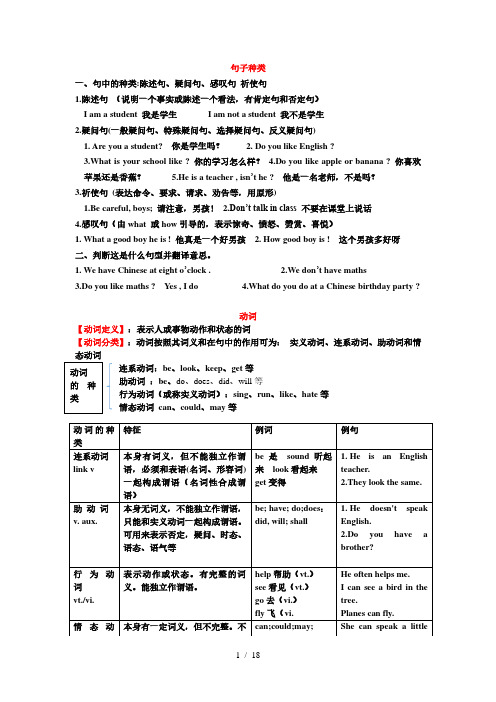
句子种类一、句中的种类:陈述句、疑问句、感叹句 祈使句1.陈述句 (说明一个事实或陈述一个看法,有肯定句和否定句) I am a student 我是学生 I am not a student 我不是学生2.疑问句(一般疑问句、特殊疑问句、选择疑问句、反义疑问句) 1. Are you a student? 你是学生吗? 2. Do you like English ?3.What is your school like ? 你的学习怎么样?4.Do you like apple or banana ? 你喜欢苹果还是香蕉?5.He is a teacher , isn ’t he ? 他是一名老师,不是吗? 3.祈使句 (表达命令、要求、请求、劝告等,用原形)1.Be careful, boys; 请注意,男孩!2.Don’t talk in class 不要在课堂上说话 4.感叹句(由what 或how 引导的,表示惊奇、愤怒、赞赏、喜悦)1. What a good boy he is ! 他真是一个好男孩2. How good boy is ! 这个男孩多好呀 二、判断这是什么句型并翻译意思。
1. We have Chinese at eight o ’clock .2.We don ’t have maths3.Do you like maths ? Y es , I do4.What do you do at a Chinese birthday party ?动词【动词定义】:表示人或事物动作和状态的词【动词分类】:动词按照其词义和在句中的作用可为: 实义动词、连系动词、助动词和情态动词连系动词:be 、look 、keep 、get 等 助动词 :be 、do 、does 、did 、will 等 行为动词(或称实义动词):sing 、run 、like 、hate 等 情态动词 can 、could 、may 等提问: 1.举出三个系动词,并说出它的特征。
英语语法-现在完成时与一般过去时的区别(附习题)

英语语法| 现在完成时与一般过去时的区别(附习题)共同点:现在完成时和一般过去时都表示一个在过去完成的动作。
区别:①现在完成时强调的是与现在的关系,如对现在产生的结果或影响等,属于现在时范围,谈论的是现在的情况。
而一般过去时只表示动作在过去某一时刻发生,不表示和现在的关系,现在情况可能已发生变化。
Who opened the door?“谁开的门?”(只强调过去开门这一动作,门现在可能已关上。
)Who has opened the door?“谁把门开了?”(强调门现在依然还开着。
)②现在完成时不能与明确的过去时间状语连用,如:three days ago, last year, yesterday, last Sunday, in 2008等等。
如句中有以上这些明确的过去时间状语,应用一般过去时。
再有,过去发生的一个动作,如现在情况已经发生的变化,也应用一般过去时。
特别提醒:如果这些过去时间状语前有since,表示“自过去某一时间一直延续到现在”,应用现在完成时。
He finished reading the book the day before yesterday.他前天读完了这本书。
I put my ruler in my pencil-box, but I can’t find it now.我把尺子放到文具盒里了,但是我现在找不它了。
My cousin has been in Nanjing since 2009.我的表弟从2009年起就呆在南京了。
③现在完成时不与when引导的特殊疑问句连用,when后只用一般过去时表示已发生的动作。
但现在完成时可与where, why等疑问词连用。
如:Where have you been?你去过哪里了?—The train has left.—When did the train leave?——火车已经驶离了。
——火车什么时候驶离的?④since引导的时间状语从句后面用一般过去时,只有前面的主句才用现在完成时。
现在完成时与一般过去时的区别练习答案解析
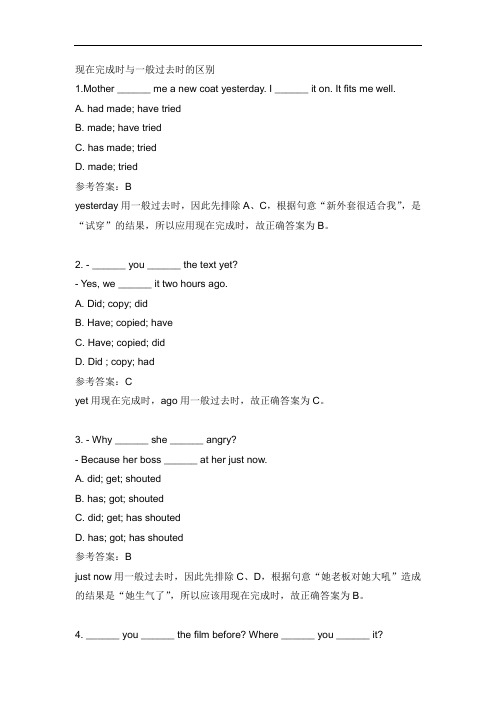
现在完成时与一般过去时的区别1.Mother ______ me a new coat yesterday. I ______ it on. It fits me well.A. had made; have triedB. made; have triedC. has made; triedD. made; tried参考答案:Byesterday用一般过去时,因此先排除A、C,根据句意“新外套很适合我”,是“试穿”的结果,所以应用现在完成时,故正确答案为B。
2. - ______ you ______ the text yet?- Yes, we ______ it two hours ago.A. Did; copy; didB. Have; copied; haveC. Have; copied; didD. Did ; copy; had参考答案:Cyet用现在完成时,ago用一般过去时,故正确答案为C。
3. - Why ______ she ______ angry?- Because her boss ______ at her just now.A. did; get; shoutedB. has; got; shoutedC. did; get; has shoutedD. has; got; has shouted参考答案:Bjust now用一般过去时,因此先排除C、D,根据句意“她老板对她大吼”造成的结果是“她生气了”,所以应该用现在完成时,故正确答案为B。
4. ______ you ______ the film before? Where ______ you ______ it?A. Have; seen; did; seeB. Did; see; did; watchC. Have; seen; have; seenD. Did; see; have; seen参考答案:Abefore用现在完成时,因此先排除B、D,根据句意“你在哪里看过”,询问的过去某个时间发生的事情,因此应该用一般过去时,故正确答案为A。
现在完成时与一般过去时的区别讲解课件(可下载带答案))

趁热打铁
I.用have been to,have gone to或have been in的适当形式填空。 1. He has been to Shanghai twice. He doesn't want to travel there any more. 2.My mother has gone to the supermarket. She isn't at home now 3. He has been in Australia for three years. He falls in love with the beautiful scenery there. 4.I have been to Yunnan. It's a good place. 5. -Where are your parents?
趁热打铁
3. We ______ to the Great Wall several times.
A. go C. have gone
B. were going D. have been
趁热打铁
4. It ______ twenty-eight years since Harry ______ Sally.
趁热打铁
10. I ______ the History Museum twice. I’ve learned a lot there.
A. visit C. have visited
B. am visiting D. will visit
A. is; has been married to B. has been; got married with C. has been; got married to D. is; has been married with
2017年中考英语专题与练习 现在完成时与一般过去时的区别(含答案)
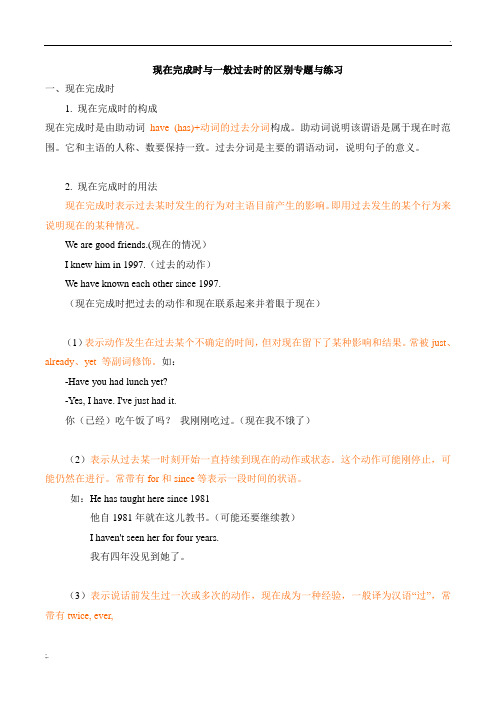
现在完成时与一般过去时的区别专题与练习一、现在完成时1. 现在完成时的构成现在完成时是由助动词have (has)+动词的过去分词构成。
助动词说明该谓语是属于现在时范围。
它和主语的人称、数要保持一致。
过去分词是主要的谓语动词,说明句子的意义。
2. 现在完成时的用法现在完成时表示过去某时发生的行为对主语目前产生的影响。
即用过去发生的某个行为来说明现在的某种情况。
We are good friends.(现在的情况)I knew him in 1997.(过去的动作)We have known each other since 1997.(现在完成时把过去的动作和现在联系起来并着眼于现在)(1)表示动作发生在过去某个不确定的时间,但对现在留下了某种影响和结果。
常被just、already、yet 等副词修饰。
如:-Have you had lunch yet?-Yes, I have. I've just had it.你(已经)吃午饭了吗?我刚刚吃过。
(现在我不饿了)(2)表示从过去某一时刻开始一直持续到现在的动作或状态。
这个动作可能刚停止,可能仍然在进行。
常带有for和since等表示一段时间的状语。
如:He has taught here since 1981他自1981年就在这儿教书。
(可能还要继续教)I haven't seen her for four years.我有四年没见到她了。
(3)表示说话前发生过一次或多次的动作,现在成为一种经验,一般译为汉语“过”,常带有twice, ever,never, three times等时间状语。
如:I have been to Beijing twice.我去过北京二次。
3.现在完成时的时间状语(1)现在完成时属于现在时范围,故不能和过去的时间状语连用。
如:yesterday,last Sunday,in1990,three years ago等。
- 1、下载文档前请自行甄别文档内容的完整性,平台不提供额外的编辑、内容补充、找答案等附加服务。
- 2、"仅部分预览"的文档,不可在线预览部分如存在完整性等问题,可反馈申请退款(可完整预览的文档不适用该条件!)。
- 3、如文档侵犯您的权益,请联系客服反馈,我们会尽快为您处理(人工客服工作时间:9:00-18:30)。
现在完成时与一般过去时的区别专题与练习一、现在完成时1. 现在完成时的构成现在完成时是由助动词have (has)+动词的过去分词构成。
助动词说明该谓语是属于现在时范围。
它和主语的人称、数要保持一致。
过去分词是主要的谓语动词,说明句子的意义。
2. 现在完成时的用法现在完成时表示过去某时发生的行为对主语目前产生的影响。
即用过去发生的某个行为来说明现在的某种情况。
We are good friends.(现在的情况)I knew him in 1997.(过去的动作)We have known each other since 1997.(现在完成时把过去的动作和现在联系起来并着眼于现在)(1)表示动作发生在过去某个不确定的时间,但对现在留下了某种影响和结果。
常被just、already、yet 等副词修饰。
如:-Have you had lunch yet?-Yes, I have. I've just had it.你(已经)吃午饭了吗?我刚刚吃过。
(现在我不饿了)(2)表示从过去某一时刻开始一直持续到现在的动作或状态。
这个动作可能刚停止,可能仍然在进行。
常带有for和since等表示一段时间的状语。
如:He has taught here since 1981他自1981年就在这儿教书。
(可能还要继续教)I haven't seen her for four years.我有四年没见到她了。
(3)表示说话前发生过一次或多次的动作,现在成为一种经验,一般译为汉语“过”,常带有twice, ever,never, three times等时间状语。
如:I have been to Beijing twice.我去过北京二次。
3.现在完成时的时间状语(1)现在完成时属于现在时范围,故不能和过去的时间状语连用。
如:yesterday,last Sunday,in1990,three years ago等。
但是,在强调动作产生的后果和影响时,可以和一些表示不确定的时间状语连用。
a. 用副词already和yet。
already一般用于肯定句中,yet一般用于否定句和疑问句中。
如:We have already finished our homework.我们已完成作业了。
They haven't finished their homework yet.他们还没有完成作业。
b.用ever 和never。
多用于否定或疑问句中,表示“曾经”或“从未”等。
如:-Have you ever been to the Great Wall? 你曾经去过长城吗?-I have never been to the Great Wall.我从未去过长城。
c.用表示到说话为止的过去时间状语,如just, before, up to now, the past few years等。
例如:I have seen her before, but I can not remember where.我以前见过她,但记不起在哪里见过。
He has been there three times the last few days.近几天他去过那里三次了。
d.用包括“现在”在内的时间状语,如:now, today, this morning (month, year, term)等。
例如:-Have you met him today? -No, I haven't.今天你见过他吗?我没有。
How many times have you been there this year?今年你去过那里多少次?(2)现在完成时可以和带有since或for等表示“一段时间”的状语连用,表示动作或状态从某一时刻开始,一直持续到现在。
如:I haven't seen him for two years.但是,像come, arrive,buy等终止性动词不能与表示“一段时间”的状语连用。
要用,必须改为“be(在)”等延续性动词来表述。
现归纳总结一下由非延续性动词到延续性动词的转换:arrive →be here begin(start)→be ondie→be dead come back →be backleave →be away fall ill(sick, asleep)→be ill(sick, asleep)get up →be up go out→be outfinish →be over put on→wear 或be onopen→be open join→be in或be a member of…close→be closed go to school →be a studentborrow→keep buy→havecatch(a cold)→have(a cold)get to know →knowbegin to study →study come to work →work等如:He has been a soldier for three years.他参军三年了。
His father has been dead for two years.他父亲去世二年了。
The film has been on for ten minutes.电影已开始十分钟了。
We have studied English for three years. 我们(开始)学英语已三年了。
4.几点注意事项(1)have been(to)与have gone( to)的区别:have been(to)表示“去过某地(现在已经回来了)”,可用于各人称;have gone(to)表示“去某地了(说话时某人不在当地)”,常用于第三人称,前者可与once ,never, several times等连用,后者则不能。
如:They have been to Beijing twice.他们去过北京两次。
He has gone to Beijing .他去北京了。
(2)如单纯表示一段时间,或强调一段时间,虽有since一词,也不必用完成时。
如:It is two years since his father died.=His father has been dead for two years.他父亲去世已有两年了。
(3)终止性动词现在完成时的否定式,已变成一种可以延续的状态,因此可以和表示一段时间的状语连用。
如:I haven't left here since 1997.自从1997年以来,我一直没有离开过这儿。
(4)表示行为或状态从过去一直持续到现在时,用现在完成时,要加表示一段时间的时间状语时,常用for+一段时间, since+时间点。
I have lived here since my childhood.我从小就一直住在这里。
I have lived here for 10 years. 我在这已经住了10年了。
(5) 在提问现在完成时的时间状语时通常用how longHow long have you lived here?注意:在表示某一行为状态持续多长时间时,根据终止时间的不同,时态使用是不一样的。
如:I lived here for a week last summer.去年夏天我在这里住了一周。
I have lived here for a week by now. 到现在为止,我已经在这里住了一周。
I will live here for a week next year.明年我会在这里住一周。
二、现在完成时与一般过去时的区别现在完成时用来表示之前已发生或完成的动作或状态,其结果的确和现在有联系。
动作或状态发生在过去,但它的影响现在还存在;而一般过去时表示过去的事实,不表示和现在的关系。
I have just been to London. I went there last month. 我刚去过伦敦,是上个月去的。
1. 过去时表示过去某时发生的动作或单纯叙述过去的事情,强调动作;现在完成时为过去发生的,强调过去的事情对现在的影响,强调的是影响。
2. 过去时常与具体的时间状语连用,而现在完成时通常与模糊的时间状语连用,或无时间状语。
一般过去时的时间状语:yesterday, last week,…ago, in1980, in October, just now, 具体的时间状语共同的时间状语:this morning, tonight, this April, now, once,before, already, recently,lately现在完成时的时间状语for, since, so far, ever, never, just, yet, till / until, up to now, in past years, always,3.现在完成时可表示持续到现在的动作或状态,动词一般是延续性的,如live, teach, learn, work, study, know.过去时常用的非持续性动词有come, go, leave, start, die, finish, become, get married等。
举例:I saw this film yesterday. (强调看的动作发生过了。
)I have seen this film.(强调对现在的影响,电影的内容已经知道了。
)Why did you get up so early? (强调起床的动作已发生过了。
)Who hasn't handed in his paper? (强调有卷子,可能为不公平竞争。
)She has returned from Paris. 她已从巴黎回来了。
She returned yesterday.她是昨天回来了。
He has been in the League for three years. (在团内的状态可延续)He has been a League member for three years. (是团员的状态可持续)He joined the League three years ago. ( 三年前入团,joined为短暂行为。
)I have finished my homework now.---Will somebody go and get Dr. White?---He's already been sent for.句子中如有过去时的时间副词(如yesterday, last, week, in 1960)时,不能使用现在完成时,要用过去时。
